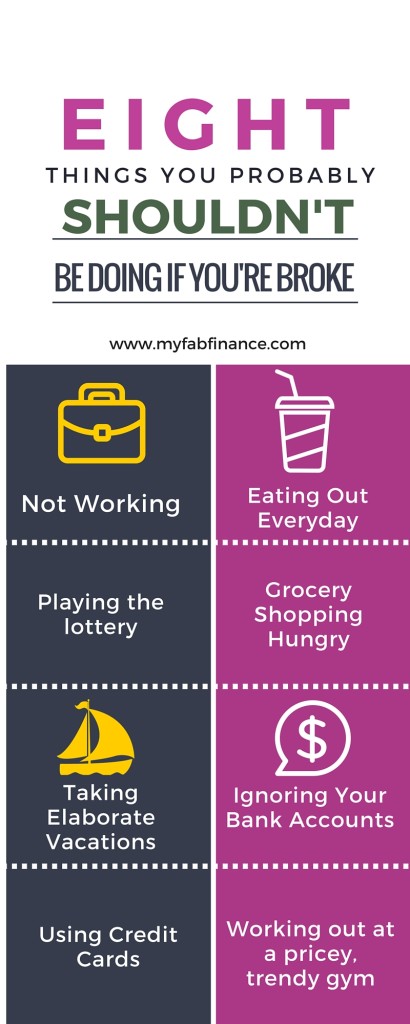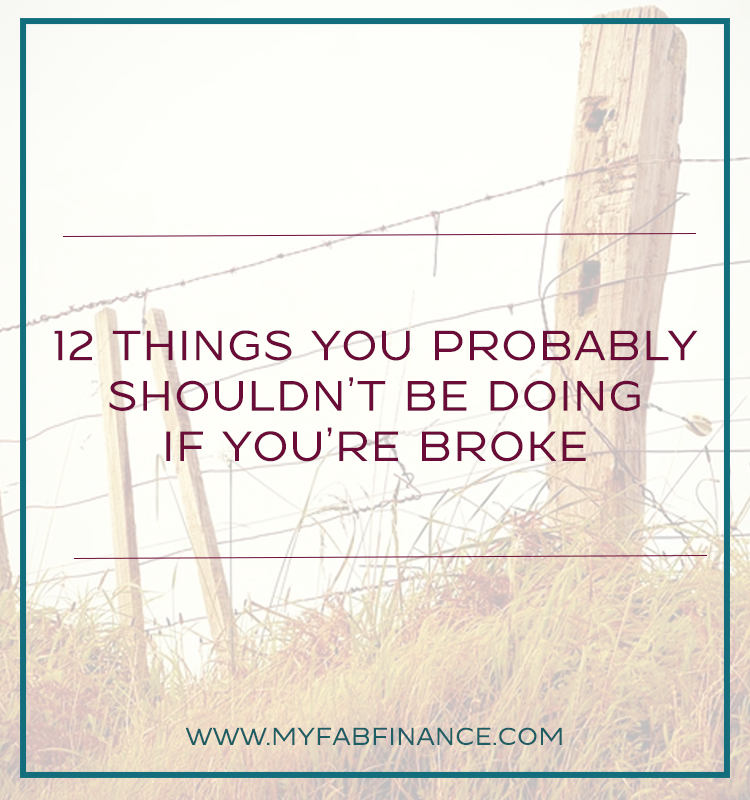There are various phases of financial overextension commonly referred to as broke. Beating broke takes sacrifice. I know that’s not what most people want to hear but it is the truth. There is no magic wand that will help you regain your financial footing.
Yeah I know.
Most if not all of the work to get back on track will come from you.
With that said, some people don’t know where to start when it comes to making the sacrifices. Here are a few things that you should probably cut out or at least cut back on until you reach a more favorable financial place.
-
Not Working
I know early retirement is all the rage, but not so quick. The first step towards improving your financial situation is having some sort of income. Your income will set the precedent for budgeting, debt reduction, and long term financial goals. So, if you’re struggling with your finances, the very best thing you can do is to get to work.
-
Eating Out Everyday
Eating out is expensive and can definitely be a budget buster! Try reducing the amount of times you eat out per week. Bring a packed lunch to work, meal prep, and stock up on easy weeknight dinner recipes. You can even try doing some sort of reward system where you can “treat” yourself once every couple of weeks to a meal out.
-
Playing the Lottery
It may happen, it may not; but the odds of you winning the lottery is 1 out of 176 million (thedailybeast.com). You are much better off investing that money into yourself. If you spend $5 per week on lottery tickets, that’s $260 a year. That may not seem like much, but that money can be used for things like car registration, a credit card bill, or any unexpected expenses. If your finances are looking a little funny, don’t count on the lottery to fix it!
-
Purchasing big ticket items
This includes TV’s, tablets, phones, cars, etc. Most big ticket items are considered luxury because you don’t need them to survive. It can be very enticing to purchase these items, especially during Black Friday and Cyber Monday sales, but they often leave you with buyer’s remorse once you’ve checked your bank account and/or received the first bill. If you absolutely “need” to purchase these items i.e. your car breaks down, follow this three step process: review your budget, shop around, and sleep on it.
-
Ignoring your accounts
You should check your account(s) daily. Knowing what balances you have and what items have cleared will avoid expensive bank fees. It’s a great habit to get into even if your you’re doing okay financially because there are often transactional mistakes that can happen like being double charged on a purchase, unauthorized transactions, bank employee errors like withdrawing from the wrong account, etc. You have 30 days to report any incorrect transactions to your financial institution, but the sooner the better.
-
Using credit cards
I’m not completely opposed to using credit cards, but it takes a great deal of responsibility to manage them well. If you’re struggling financially, it’s best to avoid using credit cards and to focus on managing the money you have on hand (whether it’s in your account or cash). Credit cards can spiral out of control and create bigger financial burdens especially if you begin to use them for everyday living expenses. The best bet is to avoid them until you’ve gotten a good grasp on your overall financial situation.
-
Working out at a pricey, trendy gym
Trendy gyms are nice, I’m not going to lie, but they aren’t necessary. With the use of the internet and apps, you can get an amazing workout in from the comfort of your home.
-
Getting your hair and nails done weekly
If your money is not right you’ll have to find a way to cut the cost or frequency of these visits. In all honesty, I haven’t been to a salon in over two years and my hair (and nails) are healthier than they’ve ever been! You can check out Tonya’s tips on growing long, healthy hair on a budget here.
-
Drinking Starbucks
The average cup of coffee at Starbucks is about $2. If you have a cup Monday – Friday all year that’s about $500! Save your money and make your own coffee at home.
-
Taking elaborate vacations
Vacations are nice, but not when you have to pay for them 2-3 years after the trip. While you’re in the process of fixing your finances, you’ll have to scale back on the types of vacations you take. An alternative option may be to do a staycation where you explore your own city or state. You may even need to skip taking a vacation for a few years to allow you enough time to plan and save for an all cash trip.
-
Grocery shopping hungry
Have you ever gone to the grocery store hungry? I have, and I ended up purchasing things I normally wouldn’t touch. Going to the store hungry is a sure fire way to go over your grocery budget. Try packing snacks while you’re out running errands, eat before you leave, and shop with a list.
-
Being unproductive
If your finances aren’t where you want them to be, the last thing you should do is nothing. You can’t come to a stop. You have to actively engage in being productive whether that’s at work (so you can keep your job), your business (so you can increase profits), your education (so you can be open for more opportunities), or your personal development (so you can be the best you). Financial struggles are often temporary and can be improved drastically by remaining consistent at being productive.
Ashley Narcisse is the founder of Budget Brain Consulting where she focuses on making budgeting easy.
Her mission is to be an asset to the community by providing accurate and quality financial and money management services while maintaining a high level of integrity and adhering to a uniform code of ethics.
Did we leave anything off this list? Feel free to share your thoughts below.


You said: